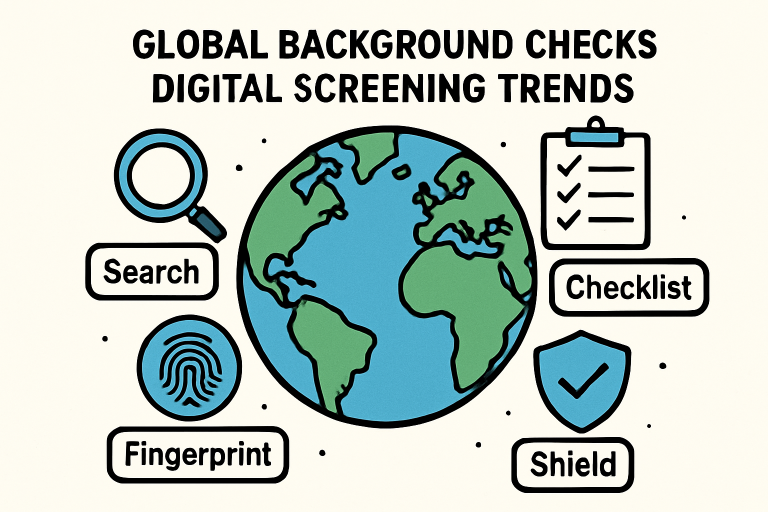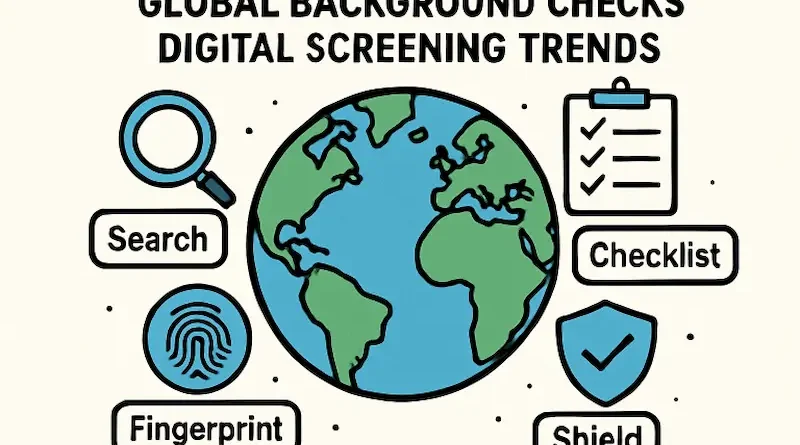Future Trends in Global Background Screening
In an interconnected and rapidly evolving global workforce, background screening practices have become increasingly complex and critical for organizations seeking to minimize risk and enhance workplace safety. As employers adapt to new expectations, technologies, and compliance requirements, the landscape of screening is witnessing profound changes. Whether for remote employees or cross-border hires, international pre-employment background screening is now a core strategy for organizations that prioritize credibility, security, and global reach.
As these developments unfold, efficiency, candidate experience, regulatory compliance, and data integrity are taking center stage. Companies that stay abreast of these trends will be best positioned to attract world-class candidates and mitigate risks, all while maintaining seamless operations. Future-focused organizations are taking steps beyond traditional verification. They’re not just seeking speed and accuracy—they are also addressing challenges posed by globalization, decentralized workforces, and stricter privacy mandates. Engaging with trusted industry solutions will be vital for navigating this evolving environment.

Automation and AI Integration
As screening workloads grow in size and complexity, automation and artificial intelligence (AI) are becoming foundational to modern background check systems. AI-driven technology analyzes thousands of data points across various sources, drastically reducing processing time while minimizing manual errors and bias. These tools can rapidly identify inconsistencies in personal histories, uncover undisclosed criminal offenses, and deliver clear risk flags to human reviewers for decision-making. This streamlining frees up HR personnel to focus on more nuanced aspects of talent acquisition. The integration of AI and automation also powers predictive analytics, enabling employers to forecast workforce trends and spot emerging compliance risks early.
Digital Identity Verification
In an era shaped by digital hiring and remote work, authenticating a candidate’s identity online is now an essential security provision. Employers are increasingly turning to sophisticated digital identity verification platforms that employ biometrics, government-issued document scans, and real-time facial recognition. These innovations are helping organizations prevent identity theft and fraudulent applications, all while supporting regulatory compliance for personal data privacy. According to industry reports, more companies are adopting digital-first identity proofing to confirm job applicant authenticity and streamline onboarding—especially when hiring talent across global jurisdictions and without in-person meetings.
Continuous Monitoring
While pre-employment screening has long been the standard, more organizations are shifting to ongoing risk management through continuous monitoring. Regularly refreshing criminal records, professional licenses, or compliance checks can alert employers to new issues that crop up during engagement, not just at the point of hire. This proactivity is invaluable for regulated industries like finance, healthcare, and education, where incidents of negligence or fraud could be catastrophic. Continuous monitoring programs enable employers to swiftly identify and mitigate risks—helping to uphold trust, integrity, and security in the workplace. Continuous monitoring also supports a culture of accountability, as employees know that compliance and conduct are consistently observed. It allows companies to respond quickly to changes in an employee’s legal or professional status, reducing potential liability. Additionally, leveraging automated monitoring technologies can streamline this process, making it more efficient and cost-effective without sacrificing thoroughness.
Globalization and Standardization
Expanding across borders introduces a host of challenges for background screening: inconsistent regulations, cultural nuances, and variable data access can complicate hiring decisions. As global footprints grow, enterprises are demanding standardized processes that promote both efficiency and legal compliance worldwide. Leading screening providers are developing frameworks to harmonize background checks across multiple countries while respecting local hiring laws. This global standardization allows organizations to replicate best practices no matter where a candidate is located, providing consistency and reducing legal exposure. For more on this movement, read the Society for Human Resource Management’s analysis of global background check expansion.
Candidate Experience Enhancements
The shift towards user-friendly screening technology isn’t just about efficiency—it’s also improving the candidate experience. Employers are adopting mobile-first platforms that let applicants upload documents, provide consent, and track case status from any device, at any time. Clear communication and transparency regarding timelines, privacy, and data use are helping to reduce candidate anxiety and abandonment, making the employer brand more attractive. A positive background check journey increases candidate trust and demonstrates respect, which are essential qualities in the competition for top talent.
Compliance Automation
Proactive compliance is non-negotiable in today’s ever-changing legal environment. New privacy regulations, like the General Data Protection Regulation (GDPR) and evolving state and regional standards, require companies to maintain airtight processing and documentation. Automated compliance management solutions simplify tracking law changes, enforce screening policy updates, and manage consent forms—effectively reducing the risk of violations and fines. Compliance automation helps organizations maintain audit-ready records, adapt swiftly to regulatory shifts, and build stakeholder confidence in their hiring and onboarding systems.
Blockchain for Credential Verification
Blockchain technology is being heralded as a breakthrough for educational and professional credential verification due to its decentralized and tamper-proof nature. When candidate records, such as degrees or certifications, are stored on a global blockchain ledger, verification becomes instant, cost-effective, and fully trustworthy. This innovation drastically cuts delays while combating credential fraud and résumé inflation. Early adopters in sectors like IT and healthcare are already leveraging blockchain-based solutions to verify critical certifications with maximum confidence and speed.
Conclusion
The future of global background screening is being shaped by forces that prioritize innovation, efficiency, candidate care, and legal defensibility. By embracing advancements in automation, digital identity verification, continuous monitoring, and blockchain authentication, organizations can future-proof their talent strategies and maintain secure, compliant, and attractive workplaces. Staying ahead of these trends will be a decisive factor for companies striving to recruit the best talent while mitigating risk in a complex global economy.
Visit the rest of the site for more interesting and useful articles.

